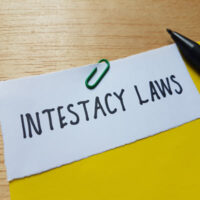The Assets Covered By Florida’s Intestacy Laws

If you die without a valid will in the state of Florida, your assets will be distributed according to Florida’s intestacy laws. But, this doesn’t apply to every single one of your assets, as certain assets aren’t covered by intestacy laws.
Going over the assets covered by Florida’s intestacy laws and, in turn, the assets not covered by these laws, while speaking with an estate planning lawyer, will help you protect your estate.
What Assets Are Covered By Florida’s Intestacy Laws?
The assets covered by Florida’s intestacy laws are as follows:
- The real estate you own, including your primary residence, vacation home, rental properties you have invested in; among a wealth of other, related, properties.
- The businesses that you own or, alternatively, any shares you own that happen to belong to a particular business.
- The investments that are in your name and only your name, such as mutual funds, stocks, and bonds, among a wide variety of others.
- The personal property that you own, such as electronic devices, furniture, your car, jewelry, and clothing, as well as any other tangible items that happen to be in your possession/name.
- The bank accounts that are in your name and only your name, such as checking and saving accounts, as well as all the assets within those accounts.
Every single one of the assets outlined above is covered by Florida’s intestacy laws. This means that, if you die without a will, these assets will be distributed according to Florida’s intestacy laws.
What Assets Are Not Covered By Florida’s Intestacy Laws?
The assets that are not covered by Florida’s intestacy laws are as follows:
- If you have any assets held in a living trust, then those assets will be distributed according to the terms of that trust, as opposed to Florida’s intestacy laws.
- If you have any retirement accounts with named beneficiaries – a 401K, for example – then these accounts will be distributed to those named beneficiaries.
- If you have a life insurance policy with a named beneficiary, then this life insurance policy will go to that named beneficiary, while bypassing the probate process.
- If you have any real estate, in your possession, that is owned by you and another person, this property will go to the person who owns it with you.
- If you have any bank accounts that are owned/managed by another person – your spouse, for example – then these bank accounts will go to that other person.
None of the assets outlined above are covered by Florida’s intestacy laws. This means that they will not go to the people who would, as per these laws, receive them in the event that you pass away without a valid will.
Speak With A Florida Estate Planning Lawyer Today
If you want to develop a will that satisfies your estate planning wishes, you should obtain legal help as soon as you can. Speak with a Florida estate planning lawyer at Millhorn Elder Law Planning Group today and we will help you develop a will that satisfies your needs.
Sources:
law.cornell.edu/wex/will
leg.state.fl.us/statutes/index.cfm?App_mode=Display_Statute&URL=0700-0799/0732/0732.html


